Struggling to form an emotional bond with your audience? Brand storytelling helps you speak to their hearts and shape a meaningful relationship. Instead of just promoting products, it helps create a narrative that resonates, builds trust, and strengthens brand identity.
With video content dominating digital marketing, a brand story video amplifies your reach and resonates with viewers. This article will explain why a brand storytelling video is essential, showing you its foundations and the steps to create it. Plus, it'll show examples to guide your own approach.
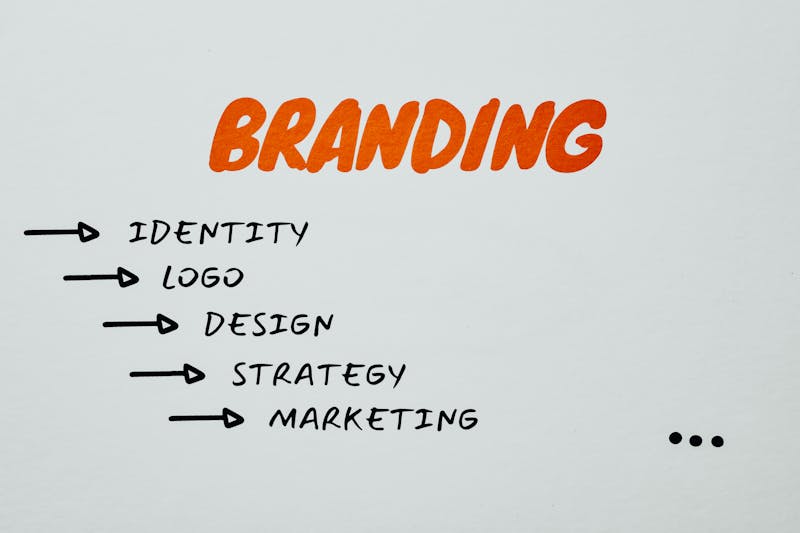
In this article
Part 1. The Foundations of Brand Storytelling
Brand storytelling shapes how audiences perceive your goals and values. Authentic narratives create an emotional bond, fostering trust and lasting loyalty. This approach will set your brand apart in a crowded market.
What Is Brand Storytelling?
Brand storytelling is a marketing strategy that connects people with a brand's message and values. Instead of focusing only on a product or service, it highlights the people and purpose behind the brand through storytelling.
The goal is to build a connection by aligning the brand's identity with the values of its audience. These connections help more people recognize the brand, stay engaged, and develop trust over time. It'll make the brand more relatable and memorable.
Why Video Amplifies Your Brand Story
One of the most effective ways to tell a brand story is through video. A brand story video uses visuals, sounds, and emotions to communicate messages in a way that text alone cannot. It helps audiences connect on a deeper level by making your message more personal and relatable.
Here's why a brand storytelling video is one of the most effective ways to share your brand story:
- Creates an Emotional Connection: Seeing real faces, hearing authentic voices, and experiencing emotions in action make the storytelling more engaging. It's also easier for audiences to relate to your brand.
- Reaches a Wider Audience: Video content can spread quickly across platforms like social media and websites. Platforms like YouTube, Instagram, and TikTok prioritize video content, helping brands gain more visibility and engagement.
- Simplifies Complex Messages: Video can break down information into an easy-to-follow format, making your brand's story clear and relatable.
- Builds Trust and Credibility: A well-crafted brand story video can make your brand feel more authentic. It can foster stronger relationships with your audience.
Part 2. How to Create a Brand Storytelling Video
A successful brand story video production requires careful planning. The plan is from developing a compelling narrative to executing high-quality visuals. Every detail matters—who your audience is, what message you want to convey, and how you bring it to life.
Pre-Production Planning

Before you start filming, having a clear plan is crucial. Pre-production is where you define your target audience, brand message, and story structure. This step is to ensure your brand story video has a strong foundation.
- Identify Your Target Audience: Understand who you're speaking to. What are their interests, pain points, and values? Tailoring your story to the right audience makes it more impactful.
- Define Your Brand Message: Clarify the core message you want to communicate. Your brand story should align with your company's values while resonating with your audience.
A great brand story includes outlining key storytelling elements:
- Conflict: What challenge or need does your brand address?
- Resolution: How does your brand solve this problem?
- Characters: Who is the face of your brand story? This could be customers, employees, or the brand itself.
- Setting: Where does your story take place? The setting should enhance the message you're conveying.
Scriptwriting and Storyboarding

Once you've planned your story, the next step is writing the script and creating a storyboard. This step ensures a smooth production process and helps you visualize your corporate storytelling video before filming.
- Building a Narrative Arc: Your script should have a beginning, middle, and end. It should engage viewers emotionally and drive them toward a takeaway.
- AI-Powered Scriptwriting: Struggling to craft a compelling script? Use Wondershare Filmora's AI Copywriting feature to generate engaging and structured scripts effortlessly.
- Creating a Storyboard: A storyboard maps out each scene, including visuals, camera angles, and transitions. This step helps align your vision with production goals and prevents unnecessary reshoots. You can use an AI storyboarding tool to create storyboard from text quickly.
Brand Story Video Production Essentials
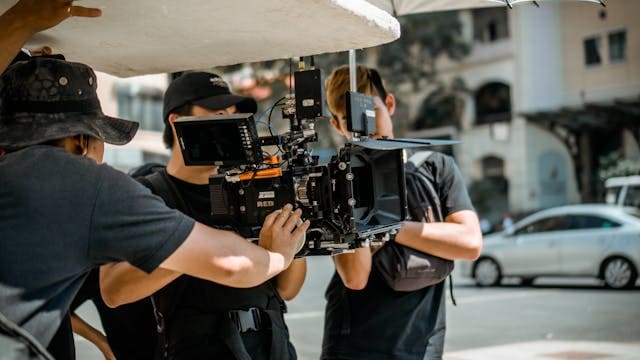
With a solid plan and script in place, it's time to start filming. Here are some key elements to focus on for a professional-looking brand story video.
Essential Equipment for High-Quality Video
- Camera: A high-quality camera ensures clear visuals, but even a smartphone with good resolution can work.
- Microphone: Good audio quality is just as important as video quality. Use an external microphone for clear sound.
- Lighting Setup: Proper lighting enhances the mood and ensures a polished look. Natural light or softbox lighting works well.
Production Setup and Considerations
- Plan Your Schedule and Budget – Plan your filming schedule, allocate resources efficiently, and keep track of expenses.
- Choose the Right Filming Location – Decide whether to film on location or in a controlled studio setting based on your brand story video's needs.
- Use Multiple Angles – Capturing different perspectives makes the video more dynamic and engaging.
Editing and Post-Production
After filming, the editing phase brings your brand storytelling video to life. Filmora offers easy-to-use tools that enhance storytelling without complex editing skills.
Here's how to edit your brand story video using Filmora:
01of 08Open Filmora and Start a New Project
Open Filmora on your computer and navigate to the Create Project tab. Choose the appropriate Aspect Ratio for your video, then click New Project to begin editing.
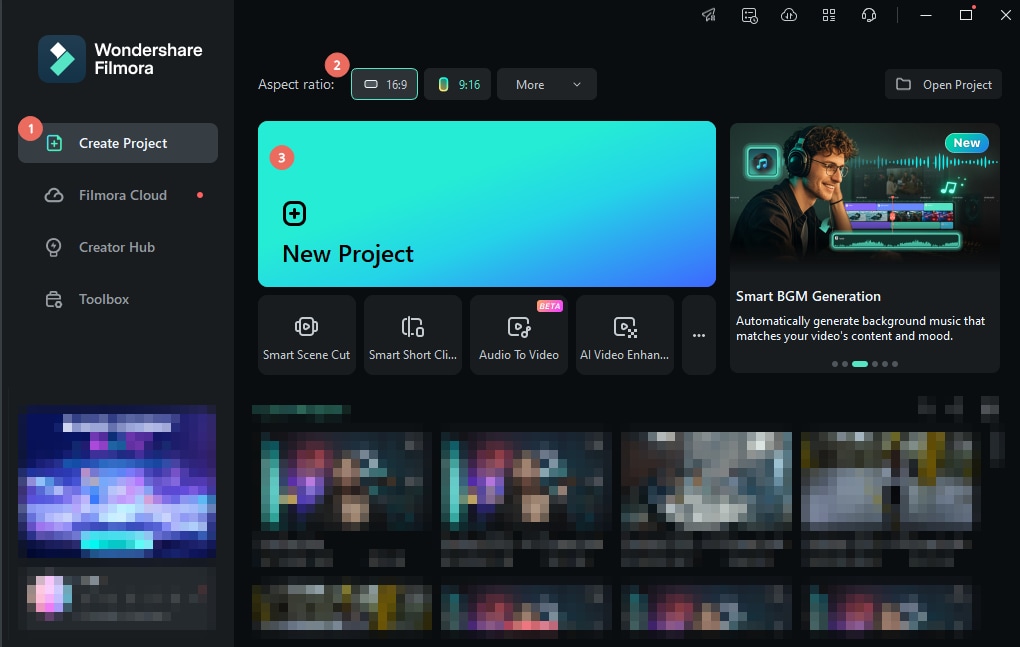
02of 08Use a Video Template for the Intro
To create a strong first impression, use a pre-made template for the intro of your brand storytelling video. This will serve as the opening section of your video, setting the tone for your brand story.
Go to the Templates tab > Templates. In the search bar, enter keywords like "brand," "marketing," or "storytelling" to find relevant options. Browse through the available templates and drag your chosen one onto the timeline.
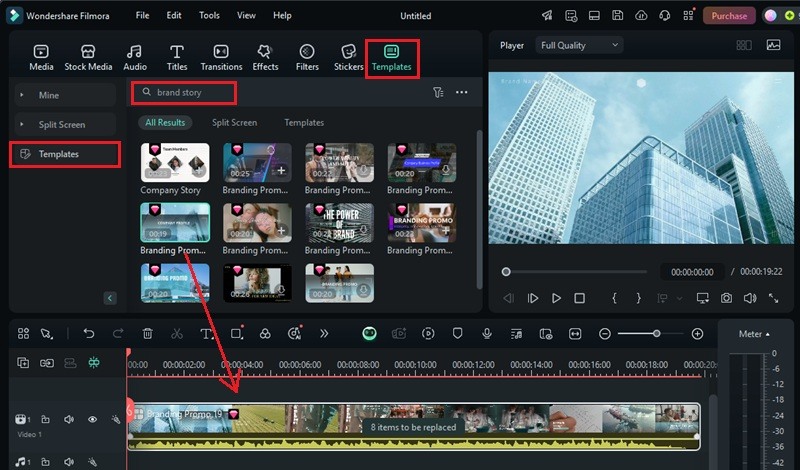
03of 08Customize Your Brand Story Video Template
Now, it's time to customize the video template. Click on the indicator in the timeline that shows how many elements can be replaced. If the template states "8 items to be replaced", this means you can swap out eight sections with your content. Click this button to start editing.

Once selected, the replacement sections will appear above the template track.
- Click the Loop icon on each segment to upload your brand's photos, video clips, or any relevant visuals that support your narrative.
- After replacing all segments, use the Edit button to fine-tune transitions, effects, or timing to match your brand's storytelling style.
On the right side of the screen, you'll find the Text tab, where you can update the default text in the template. Add key messages, a mission statement, or a tagline that represents your brand's story. Once you're satisfied with the changes, click Close to save your edits.
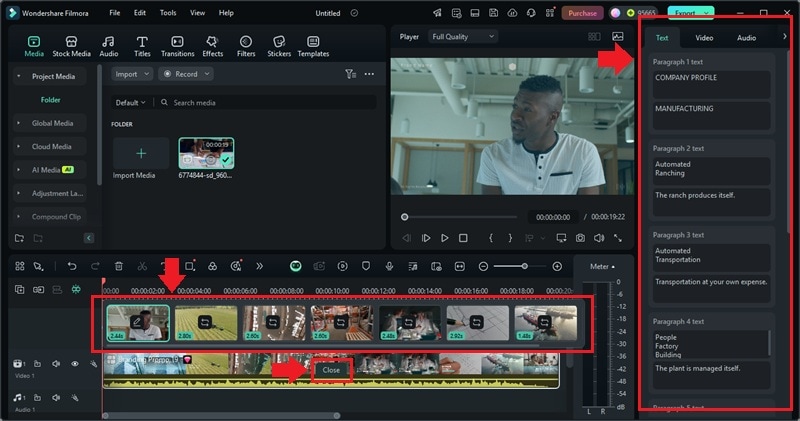
To preview the full video, click Expand on the timeline and watch how your brand story is coming together.

04of 08Continue Adding Your Other Clips to the Timeline
Once the intro is in place, you can add the rest of the video by importing other clips and organizing them in the timeline.
Go to Media > Project Media > Import Media, then upload the visuals you want to include in your brand story video. Drag and drop the clips onto the timeline in the correct order to create a smooth narrative flow.
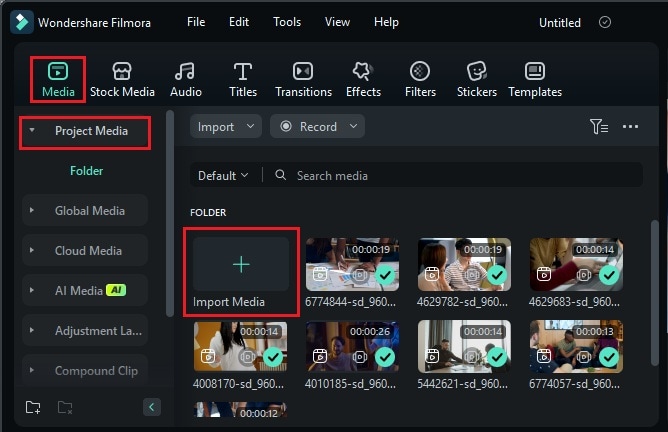
Arrange them in sequence to ensure your story unfolds naturally. Trim unnecessary parts by hovering over a clip's edge until the Trim icon appears. Then, click and drag the icon to shorten the clip, keeping only the essential parts.
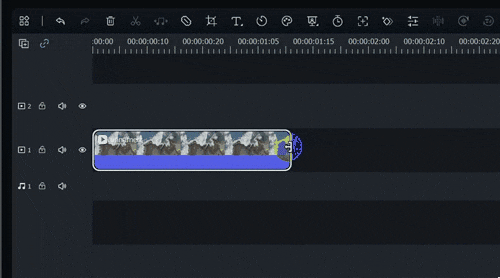
05of 08Add a Voiceover Using AI Text-to-Speech
No need to record your own voice. Filmora's AI Text-to-Speech feature can generate a professional voiceover for your brand storytelling video. Go to Audio > Text to Speech > Start to begin.
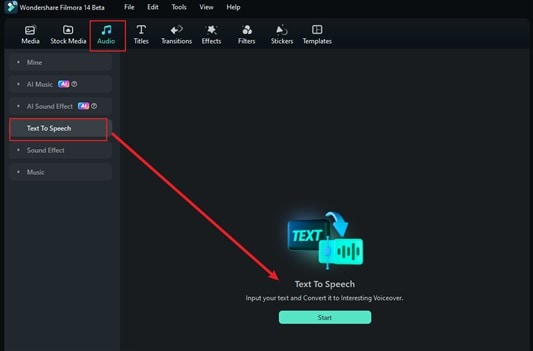
Type or paste your script, or use AI Copywriting to generate text if needed. Choose a voice from the Voice Library, then click Generate to convert the text into speech.
Tip: Enable the Auto Split tool to break long paragraphs into smaller sections.

06of 08Enhance Your Brand Story Video with AI-Generated Music
Most video templates come with pre-set background music. But, you may need additional audio for the rest clips of your brand storytelling video. Filmora's AI Music Generator lets you create a custom soundtrack that fits your brand's tone and message.
- Go to Audio > AI Music, then click the Plus (+) icon to choose the Mood, Theme, and Genre that best fits your video's message.
- Open the Settings menu to adjust the Tempo and Music Duration. Once everything is set, click Generate to create a soundtrack that complements your brand story.
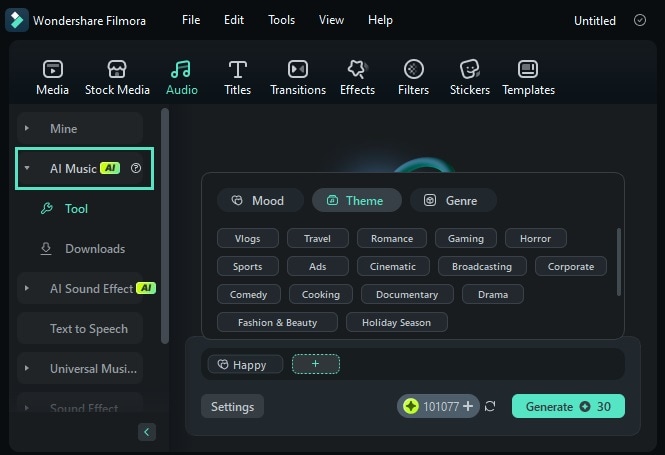
07of 08Strengthen Your Brand Identity with an Animated Logo
In Filmora, you can easily create a logo animation to enhance your video's branding. Go to Media > Influence Kit. Then, under the "Brand Transmission, Logo Reveal" option, select Start Creating.
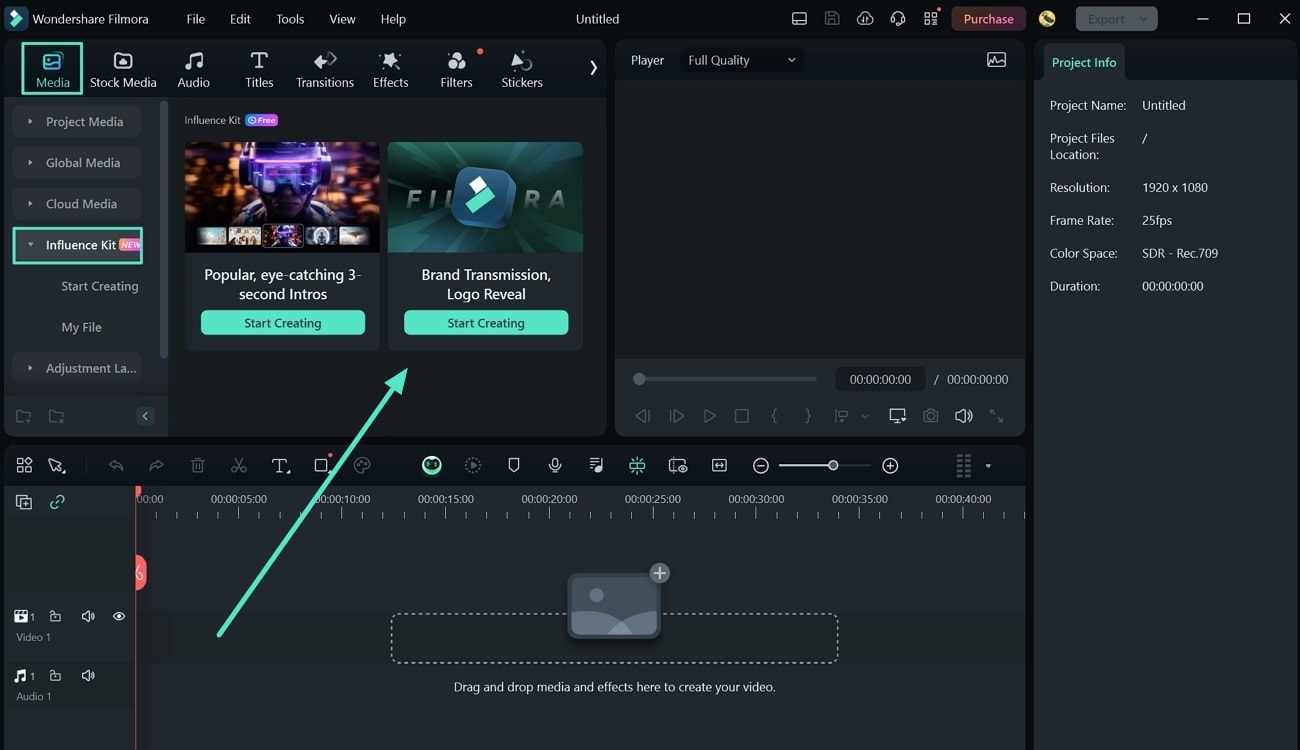
A new window will open, allowing you to browse various logo animation styles. Select one of the logo styles and click Start Creating to proceed.
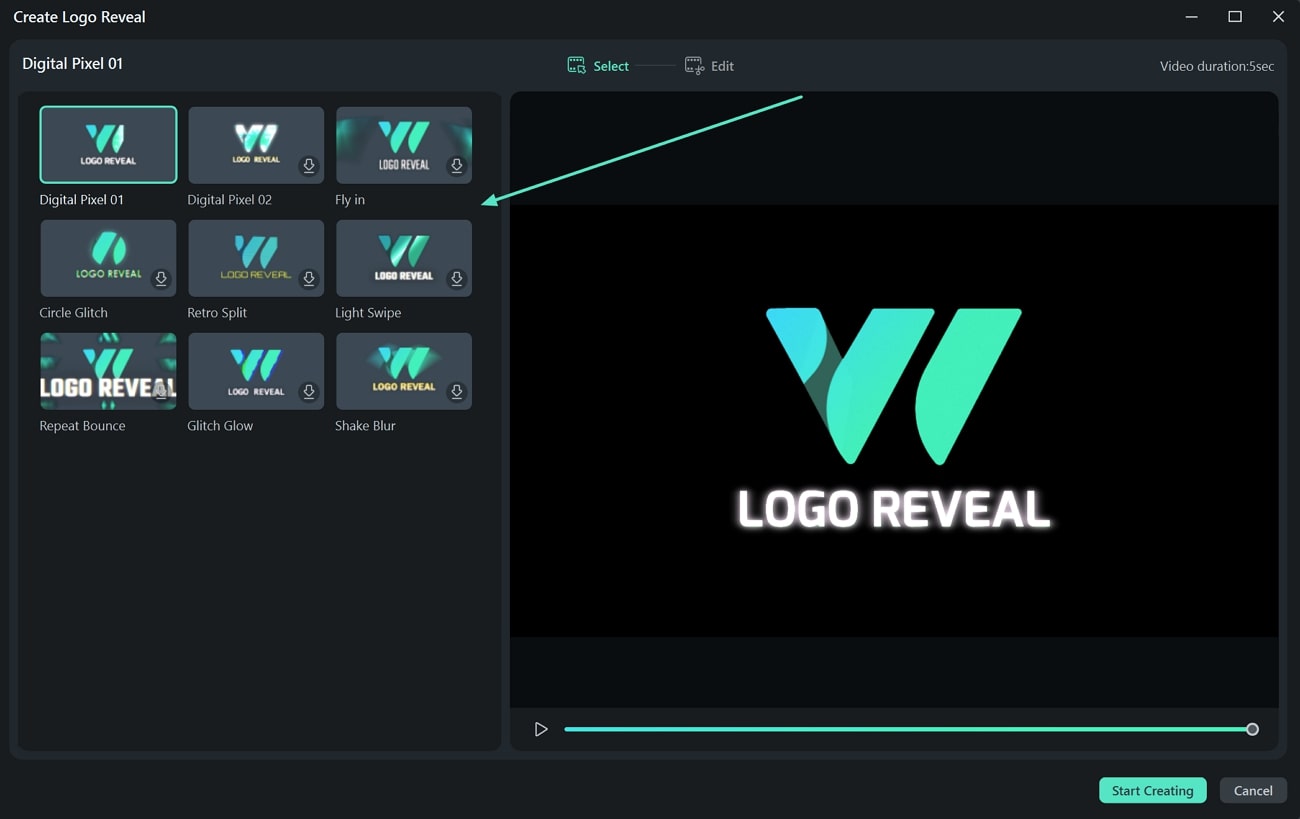
Next, go to the Add Your Logo box and click Add to upload your brand's logo. You can also customize the accompanying text in the Edit Text section to match your brand message. Once satisfied with your edits, click Finish to apply the animation.
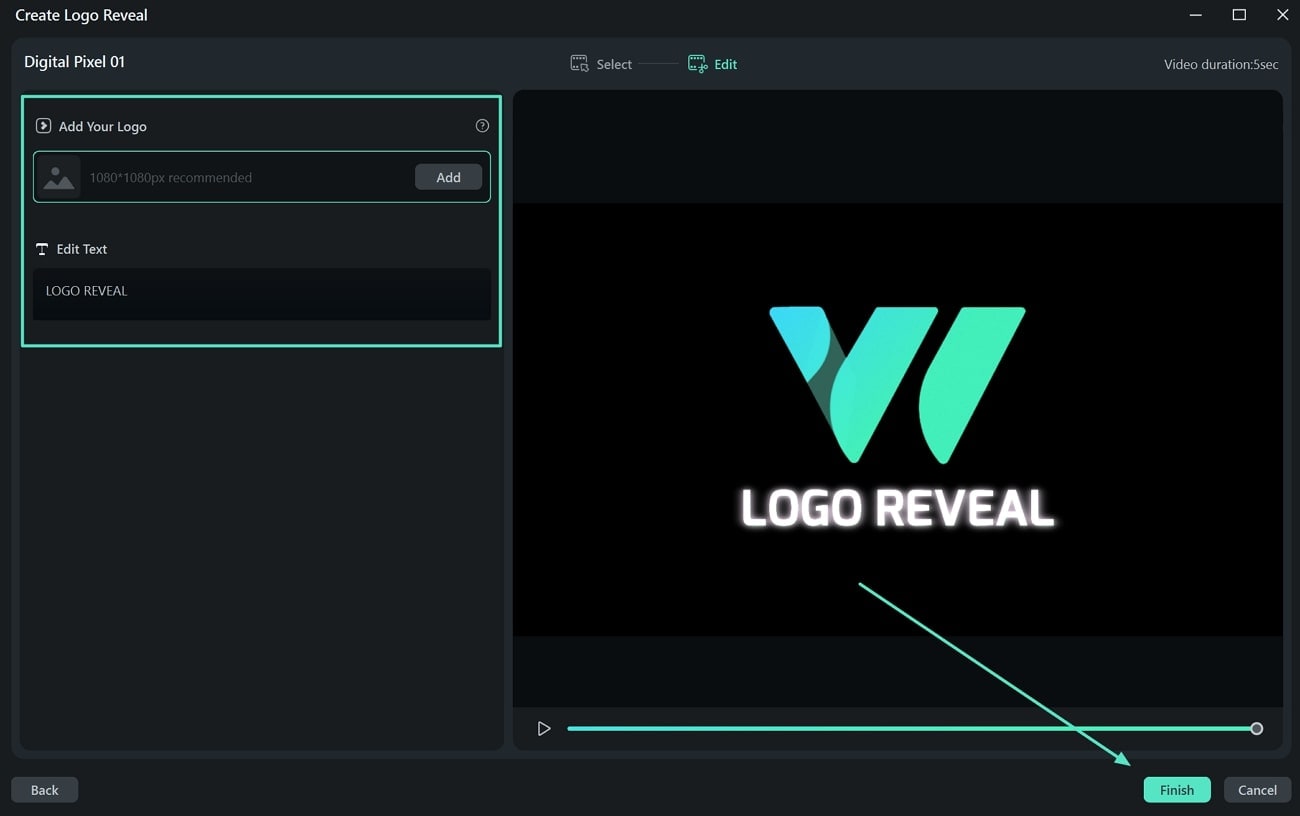
08of 08Preview and Export Your Video
Before finalizing your brand storytelling video, take a moment to preview it to ensure everything flows smoothly. Watch the video from start to finish, checking for any necessary adjustments to text, music, transitions, or effects.
Once you're satisfied with the final edit, click the Export button to open the export settings.
- Select Local and choose a preferred format (MP4, MOV, etc.).
- Give your video a title and select a save location on your device.
- Adjust settings such as resolution, frame rate, and file size to optimize playback quality.
- After setting your preferences, click Export to save the final version of your video.
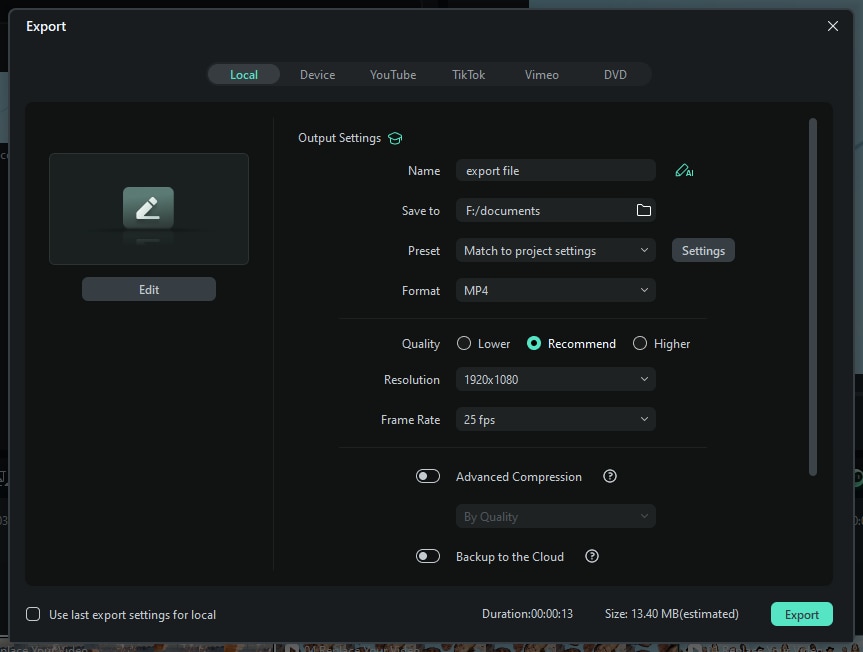
Now, you're ready to share your brand story video on social media, websites, or marketing campaigns to connect with your audience effectively!
Part 3. Brand Story Video Examples
Looking for inspiration? Here are some brand story video examples that demonstrate the power of storytelling in marketing. These videos effectively use emotion, authenticity, and clear messaging to create a lasting impact. Let's break down what makes them successful and how to apply the same principles to your video.
Nike – "You Can't Stop Us"
Nike's "You Can't Stop Us" campaign is a perfect example of brand storytelling that resonates emotionally. The video features a split-screen montage of athletes from different backgrounds. It highlights themes of perseverance, unity, and overcoming challenges.
Why it Works:
- Authenticity: Real stories from athletes make the brand feel relatable.
- Emotional Appeal: Inspires viewers with powerful visuals and narration.
- Strong Brand Identity: Aligns with Nike's message of resilience and determination.
Key Takeaway: Your brand story should reflect real emotions and experiences to forge a deeper connection with your audience.
Coca-Cola – "Share a Coke"
Coca-Cola's "Share a Coke" campaign is a brilliant example of brand storytelling that turns a simple product into a personal experience. The video features people finding bottles with names that mean something to them, encouraging connections and shared moments.
Why it Works:
- Personalization: By adding names to bottles, Coca-Cola made its product feel more personal.
- Encourages Engagement: Viewers were inspired to find their names or those of their loved ones.
- Memorable Campaign: The emotional appeal made Coca-Cola more than just a drink—it became a way to connect.
Key Takeaway: Storytelling can make a product feel more meaningful by tying it to real-life emotions and relationships.
Apple – "The Underdogs: Swiped Mac"
Apple's "The Underdogs: Swiped Mac" is a brand storytelling video that blends humor, action, and problem-solving to showcase Apple's products in a real-world scenario. The video follows a group of office workers on a mission to recover a stolen MacBook. It demonstrates how Apple's ecosystem helps them stay productive and connected.
Why it Works:
- Engaging Narrative: The fast-paced, cinematic approach makes it feel like a mini-movie rather than a traditional ad.
- Product Integration: Apple seamlessly weaves its devices (MacBook, AirTags, iPhones, and more) into the story without feeling forced.
- Relatable & Entertaining: The workplace setting and problem-solving scenario make it appealing to professionals.
Key Takeaway: A brand story video can be entertaining and engaging while subtly reinforcing product benefits and usability in everyday situations.
Conclusion
Brand storytelling is a powerful way to build trust, engage your audience, and create a lasting impression. A well-crafted video can bring your message to life, making your brand more relatable and memorable. Storytelling helps strengthen your brand identity.
Looking at some of the best brand story videos, it's clear that emotion, authenticity, and clarity play a key role in effective storytelling. With Filmora's easy-to-use tools, templates, and AI-powered features, you can create a brand storytelling video that connects with your audience. Try it today!



 100% Security Verified | No Subscription Required | No Malware
100% Security Verified | No Subscription Required | No Malware


